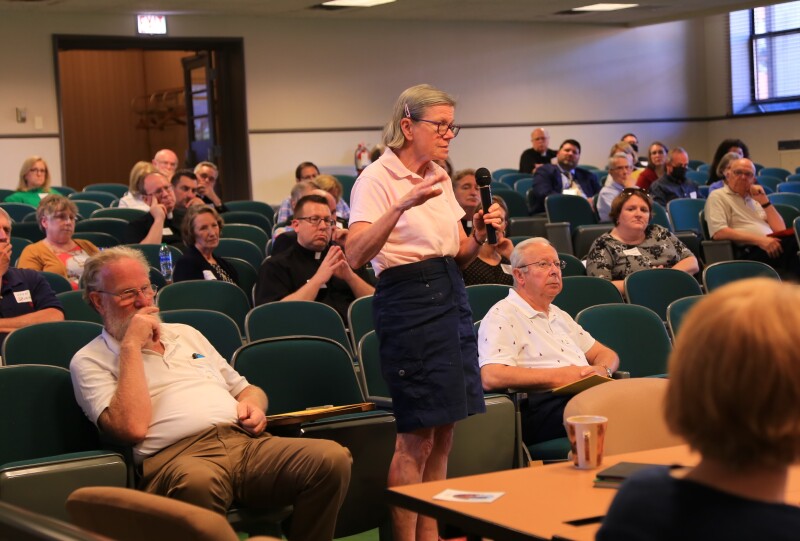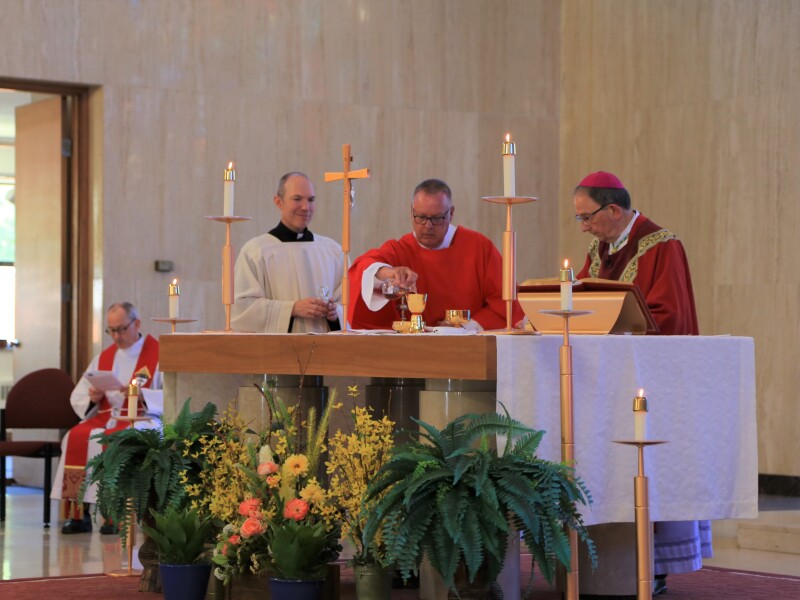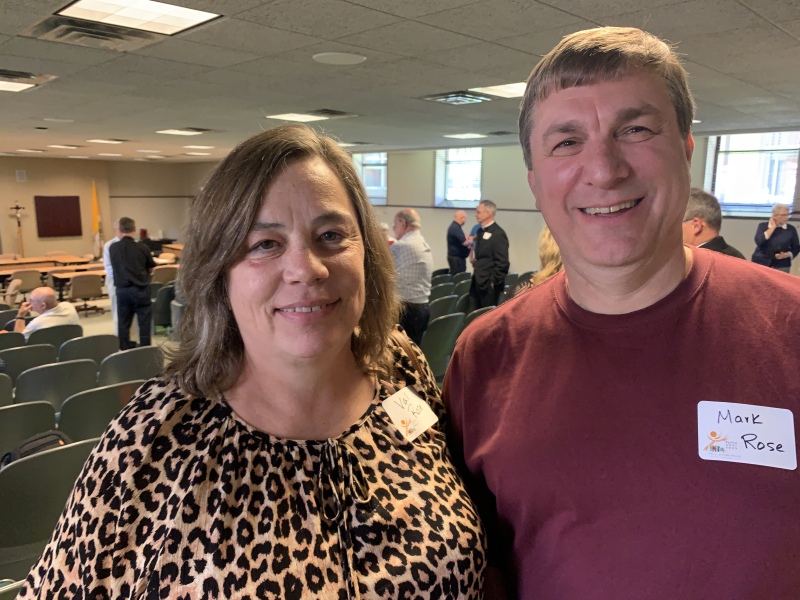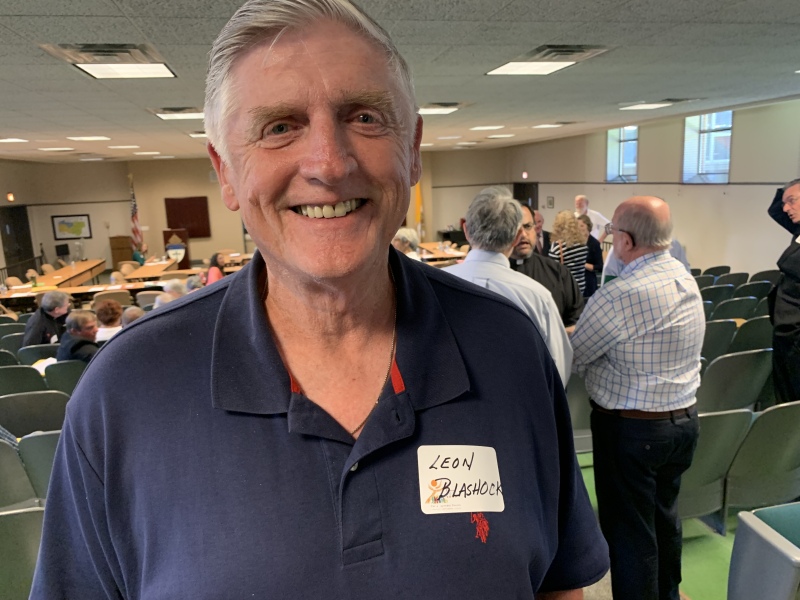
DRAFT OF DOCUMENT BEING PREPARED FOR THE SYNOD ON SYNODALITY SHARED WITH FACILITATORS
Anne-Marie Welsh
06/21/2022

insightsand offer refinements concerning the draft of the document that will be sent
to the Vatican for the 2023 Synod on Synodality. Photo/AMWelsh
NORTHWEST PA — Distinct themes have emerged from the 51 reports submitted by facilitators who held listening sessions in parishes, schools and religious communities, as well as the 94 online respondents who weighed in during the preparation phase of For a synodal Church: communion, participation, mission. The sessions were the first step in a process for the Vatican synod slated to begin in 2023. Most comments fell into one of four categories: welcome and inclusivity; mission and outreach; communications; and leadership.
All parishes around the globe were invited to participate. Find a refresher about this worldwide event at www.eriercd.org/synod.html, which not only details local participation in the process, but also links to the Vatican website dedicated to the upcoming synod.
More than 3,000 people in the Diocese of Erie attended parish sessions this winter. Facilitators were trained by Deacon Steve Washek and the Faith Formation team he oversees, at the request of Bishop Lawrence Persico. Listening session facilitators and diocesan administrators received drafts of the preliminary report before gathering at St. Mark Center, Erie, on June 10, to share their thoughts and offer refinements.
After Mass with the bishop as principal celebrant, Deacon Washek provided an overview of the major themes in the draft. Several insights and refinements were proposed during two engaging sessions of dialogue, but the general feeling was surprise and pleasure that distilling the reports into a single, 10-page document successfully captured the tone and the information that had been submitted.
“I was very pleased with the report,” said Val Rose, who facilitated sessions at All Saints Parish in Waterford, along with her husband, Mark . “Even if this doesn’t go on any further, it will help our local parish.”
In brief, respondents indicated they feel welcome and included as part of the community while

the Mass celebrated by Bishop Persico, right, as
the meeting of facilitators and administrators
began. Father Chris Singer, chancellor, is seen
to the left of Deacon Washek. Photo/AM Welsh
attending Mass and receiving the Eucharist. At the same time, many feel there is too much emphasis on rules and regulations and that restrictions around Communion are too strict. Many said they have experienced or witnessed a sense of exclusion.
Regarding mission and outreach, adults in the Diocese of Erie are hungry for more adult faith formation, and people of all ages are seeking more opportunities for service, including engagement with their neighborhoods. There is significant interest in greater focus on those who are marginalized and on more involvement with social justice issues.
Much work needs to be done regarding communications. People expressed a lack of knowledge of what is happening at both parish and diocesan levels. They do not feel included in decision making, and are unsure of even basic information, such as whether or not their parish has a pastoral council. They are calling for multiple modes of communication and more opportunities for input.
Regarding leadership, participants said they generally do not trust church hierarchy at the universal level, and would also like to see the role of women expand. They hope for more diversity in boards and advisory groups at the diocesan level, and spoke about how parish vibrancy is deeply tied into the pastor’s approach, while recognizing priests are stretched too thinly. Participants also said lay leadership is a resource that could be better utilized.
The final report will be made available on the diocesan website in early July.
One comment made at the session was that many of the concerns raised in the report can be dealt with at the parish level.
“It’s all a matter of getting volunteers and people interested in solving the issues that they brought up,” said Leon Blashock of St. Boniface Parish, Kersey. “It’s one thing to complain about something. It’s a whole other matter to take stock and do something about it.” He looks forward to working with parishioners on a number of topics.

Photo/Welsh
“We have a very engaging group of people in our parish that I know, if we talk to them and ask them to do certain things that were suggested, they would do it,” he said. Looking over the concerns that were shared during the sessions he facilitated, he felt that about 70 percent could be addressed in that fashion.
The draft was written by Maria Caulfield, executive assistant in the Chancery and a graduate student in theology at the Franciscan University of Steubenville, with the guidance of Msgr. Edward Lohse, vicar general. Members of the Faith Formation team serving with Deacon Washek included Mary Hickin, Jessie Hubert, Kate Wilson and Jillian Zaczyk, with the support of Jen Durney and Faye Froess.
Msgr. Lohse was the final speaker at the session during which the draft was presented for refinement.
“We have been given a tremendous gift in having a window into the hearts and aspirations, the hopes of the people we serve,” he said. “We have a duty to see to it that we make the best use of that information.”
Msgr. Lohse reminded those in attendance that in the large picture of the synodal process, the diocesan phase of preparation is coming to a close. The Diocese of Erie’s report will now be integrated into a report from Region III, which comprises the dioceses of Pennsylvania and New Jersey. Deacon Washek is serving on that committee.
From there, the report will go the United States Conference of Catholic Bishops and then combined with Canada’s report, creating a document representing North America.
Msgr. Lohse explained that the synod of bishops will meet in Rome in 2023, and at the end of their

Photo/AMWelsh
work, a document called a post synodal apostolic exhortation, signed by the pope, will be issued.
“That will be the directive to the church,” Msgr. Lohse explained. But like others in attendance at the session June 10, he looks forward to ensuring the information shared at parishes is addressed locally.
“I’m very hopeful that we’re going to find ways in the future to keep respondents engaged,” he said. “I’m heartened by the fact that a lot of you would like to continue listening sessions. We need to discern through (the material), to pray about it and, under the guidance of the bishop, find a way forward.”
Synods at the local level had fallen into disuse by the church.
“In the first 50 years of the diocese, we had five synods,” Msgr. Lohse said. “In the second 50 years, we had two. We haven’t had one in 80 years.” He noted that thanks to the Second Vatican Council, participation in the synods today is open to everyone.
Bringing the session to a close, he said: “I can’t tell you what’s going on in the mind of the pope, but I think it’s kind of exciting. Who knows where the road ahead will lead? But we’ll be on it together, and the Holy Spirit will guide the way.”
-
